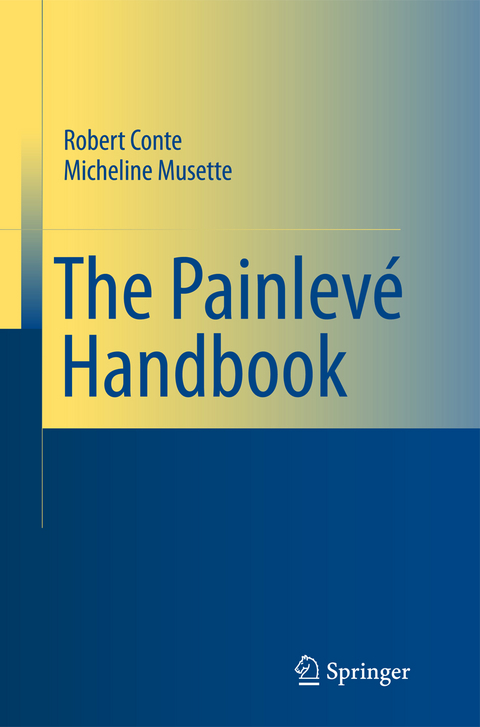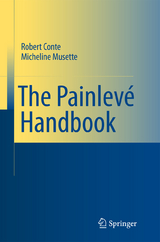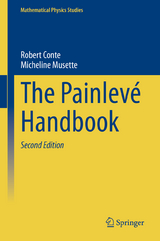The Painlevé Handbook
Springer-Verlag New York Inc.
978-1-4020-8490-4 (ISBN)
- Titel erscheint in neuer Auflage
- Artikel merken
Nonlinear differential or difference equations are encountered not only in mathematics, but also in many areas of physics (evolution equations, propagation of a signal in an optical fiber), chemistry (reaction-diffusion systems), and biology (competition of species).
This book introduces the reader to methods allowing one to build explicit solutions to these equations. A prerequisite task is to investigate whether the chances of success are high or low, and this can be achieved without any a priori knowledge of the solutions, with a powerful algorithm presented in detail called the Painlevé test. If the equation under study passes the Painlevé test, the equation is presumed integrable. If on the contrary the test fails, the system is nonintegrable or even chaotic, but it may still be possible to find solutions.
The examples chosen to illustrate these methods are mostly taken from physics. These include on the integrable side the nonlinear Schrödinger equation (continuous and discrete), the Korteweg-de Vries equation, the Hénon-Heiles Hamiltonians, on the nonintegrable side the complex Ginzburg-Landau equation (encountered in optical fibers, turbulence, etc), the Kuramoto-Sivashinsky equation (phase turbulence), the Kolmogorov-Petrovski-Piskunov equation (KPP, a reaction-diffusion model), the Lorenz model of atmospheric circulation and the Bianchi IX cosmological model.
Written at a graduate level, the book contains tutorial text as well as detailed examples and the state of the art on some current research.
Conte and Musette are recognized authorities in the area of Painlevé equations and the Painlevé property.
1. Introduction. 1.1. Perturbative vs. nonperturbative method. 1.2. A brief history. 1.3. Outline.
2. Singularity structure in the complex plane, the Painlevé test. 2.1. Painlevé test of the Lorenz model. 2.2. Test of the Kuramoto-Sivashinsky equation. 2.3. Test of the cubic complex Ginzburg-Landau equation. 2.4. Test of the Duffing-van der Pol oscillator. 2.5. Test of the cubic Hénon-Heiles Hamiltonian system. 2.6. The Fuchsian perturbative test. 2.7. The non-Fuchsian perturbative test.
3. Integrating ordinary differential equations. 3.1. First integrals of the Lorenz model. 3.2. Integration of the four integrable cases of the Lorenz model. 3.3. General traveling wave of KdV equation. 3.4. General traveling wave of NLS equation. 3.5. The partially integrable case. 3.6. Elliptic traveling waves of KS and CGL3. 3.7. Trigonometric traveling waves of Kuramoto-Sivashinsky equation. 3.8. Trigonometric traveling waves of the CGL3 equation. 3.9. General method to find elliptic and trigonometric traveling waves. 3.10. A first integral of the Duffing-van der Pol oscillator. 3.11. Separation of variables in the cubic Hénon-Heiles Hamiltonians. 3.12. Direct integration of the cubic Hénon-Heiles Hamiltonians. 3.13. Single-valued solutions of the Bianchi IX cosmological model. 3.14. Predictions of the Nevanlinna theory on KS and CGL3.
4. Painlevé property and Painlevé test for partial differential equations. 4.1. On reductions. 4.2. Soliton equations. 4.3. Painlevé property for PDEs. 4.4. Optimal expansion variable for the Painlevé test. 4.5. Painlevé test on the example of KdV. 4.6. The case of partially integrable equations, example of KPP.
5. From the test to explicit solutions of PDEs. 5.1. Information obtained from the Painlevé test. 5.2. Two approaches for building the N-soliton solution. 5.3. Lax pair, Darboux and Crum transformations, singular part transformation, nonlinear superposition formula. 5.4. A choice of Lax pairs. 5.5. Algorithm of the singular manifold method. 5.6. The singular manifold method in the integrable case. 5.7. The singular manifold method in the nonintegrable case. 5.8. The singular manifold method under a reduction to an ODE.
6. Quartic Hénon-Heiles Hamiltonian. 6.1. Liouville integrability of the quartic HH Hamiltonians. 6.2. Painlevé property of the quartic HH Hamiltonians. 6.4. Final picture for HH3 and HH4.
7. Discrete nonlinear equations. 7.1. Generalities. 7.2. The discrete Painlevé property. 7.3. The test of singularity confinement. 7.4. The test of polynomial growth. 7.5. The test of perturbation of the continuum limit. 7.6. Discrete Lax pairs. 7.7. Discrete Riccati equation. 7.8. Exact discretization of the Ermakov-Pinney equation. 7.9. Exact discretization of the Weierstrass equation. 7.10. Discrete versions of the NLS equation. 7.11. A sketch of the discrete Painlevé equations.
8. FAQ (Frequently asked questions)
A. The classical results of Painlevé and followers
B. Brief presentation of the elliptic functions
C. Basic introduction to the Nevanlinna theory
D. More on the Painlevé transcendents. D.1. Coalescence cascade. D.2. Hamiltonian structure. D.3. Lax pairs. D.4. Classical solutions. D.5. Irreducibility.
E. The bilinear operator of Hirota.
F. Algorithm for computing the Laurent series.
| Zusatzinfo | XXIII, 256 p. |
|---|---|
| Verlagsort | New York, NY |
| Sprache | englisch |
| Maße | 155 x 235 mm |
| Gewicht | 594 g |
| Themenwelt | Mathematik / Informatik ► Mathematik ► Analysis |
| Naturwissenschaften ► Physik / Astronomie ► Allgemeines / Lexika | |
| ISBN-10 | 1-4020-8490-0 / 1402084900 |
| ISBN-13 | 978-1-4020-8490-4 / 9781402084904 |
| Zustand | Neuware |
| Informationen gemäß Produktsicherheitsverordnung (GPSR) | |
| Haben Sie eine Frage zum Produkt? |
aus dem Bereich





